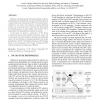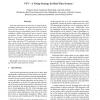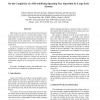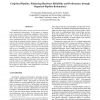110
Voted
PRDC
2007
IEEE
15 years 8 months ago
2007
IEEE
This paper describes the implementation of a processorgroup membership protocol in an experimental real-time network. The protocol is appropriate for fault-tolerant distributed sy...
104
click to vote
PRDC
2008
IEEE
15 years 8 months ago
2008
IEEE
Advancements in technology enable integration of a large number of cores on a single silicon die. At the same time, aggressive technology scaling has an ever-increasing adverse im...
PRDC
2008
IEEE
15 years 8 months ago
2008
IEEE
Multiserver operating systems have great potential to improve dependability, but, paradoxically, are paired with inherently more complex interprocess communication (IPC). Several ...
91
Voted
PRDC
2008
IEEE
15 years 8 months ago
2008
IEEE
Real-time applications typically have to satisfy high dependability requirements and require fault tolerance in both value and time domains. A widely used approach to ensure fault...
124
click to vote
PRDC
2008
IEEE
15 years 8 months ago
2008
IEEE
Many large scale systems, like grids and structured peer to peer systems, operate on a constrained topology. Since underlying networks do not expose the real topology to the appli...
101
click to vote
PRDC
2008
IEEE
15 years 8 months ago
2008
IEEE
Correctly specifying requirements for composite systems is essential to system safety, particularly in a distributed development environment. Goal-oriented requirements engineerin...
135
click to vote
PRDC
2008
IEEE
15 years 8 months ago
2008
IEEE
We consider efficient real-time communication mechanisms for applications in unreliable and partitionable networks, where network partitions can occur unpredictably and nodes can ...
101
click to vote
PRDC
2008
IEEE
15 years 8 months ago
2008
IEEE
Reliability has become a serious concern as systems embrace nanometer technologies. In this paper, we propose a novel approach for organizing redundancy that provides high degree ...
PRDC
2009
IEEE
15 years 8 months ago
2009
IEEE
—We investigate the impact of irrecoverable read errors—also known as bad blocks—on the MTTDL of mirrored disks, RAID level 5 arrays and RAID level 6 arrays. Our study is bas...
148
click to vote
PRDC
2009
IEEE
15 years 8 months ago
2009
IEEE
—With ever-growing complexity of computer and communication systems analytical methods do not scale, especially with respect to dependability assessment of information technology...




